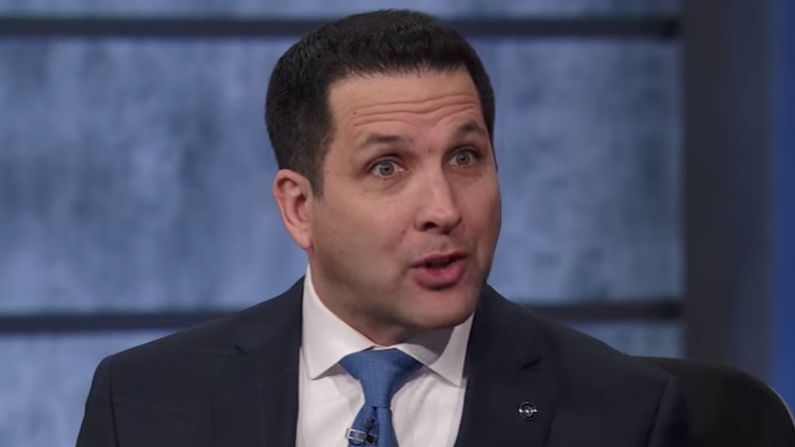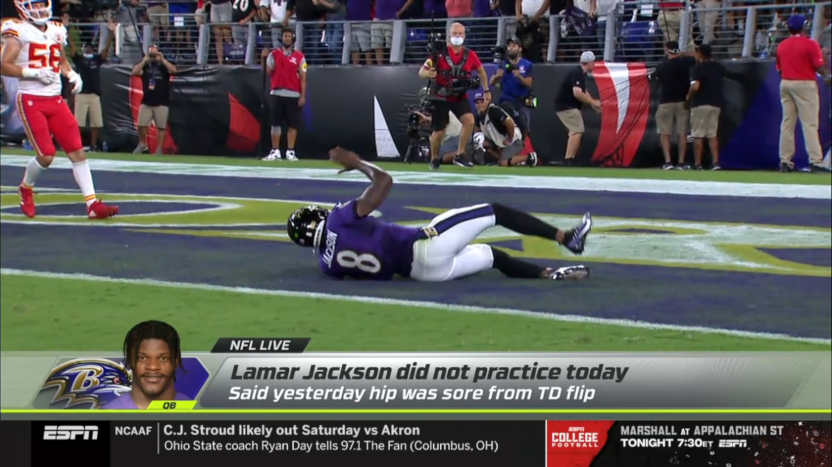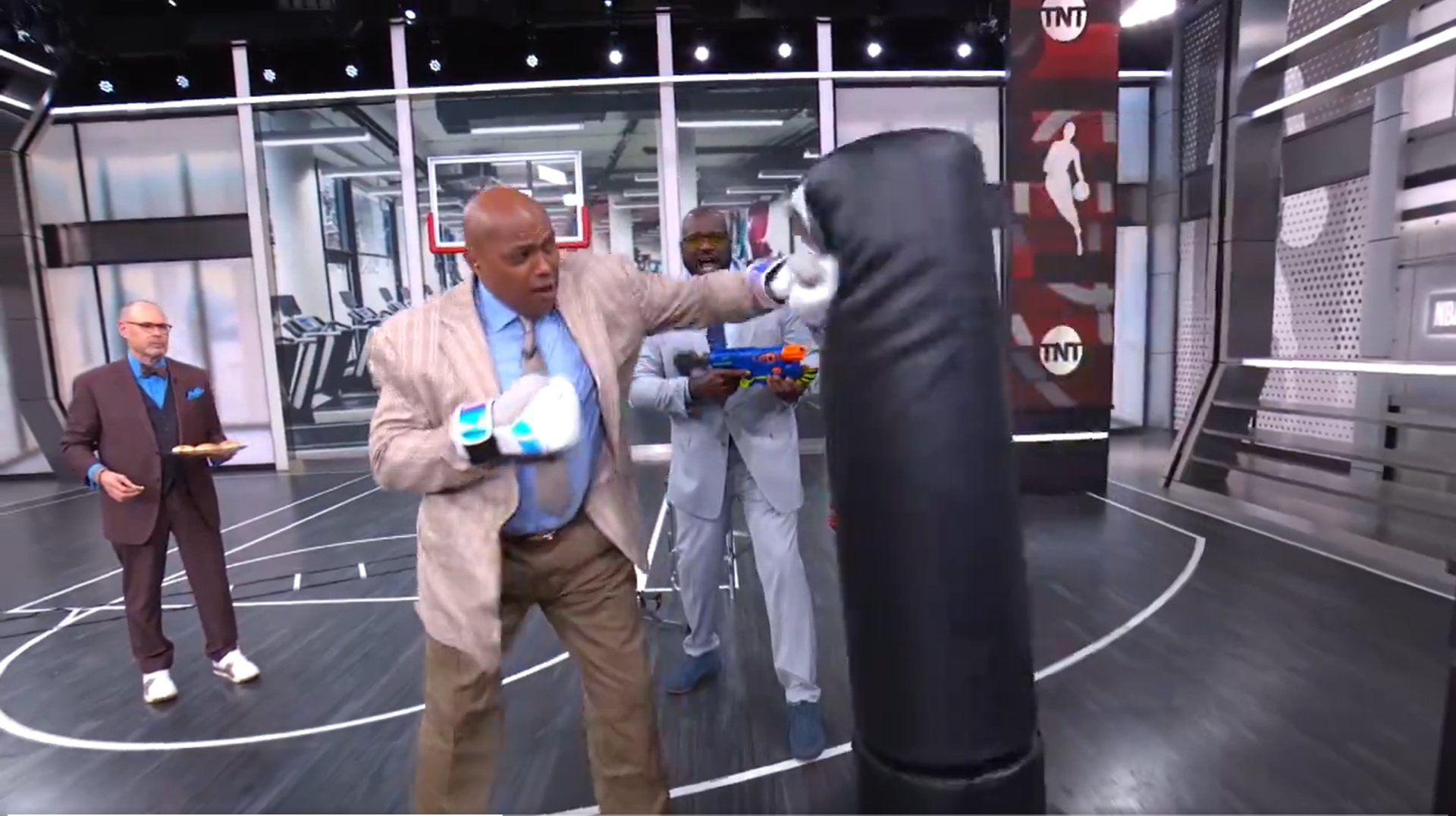The exact reason why a player misses practice isn’t necessarily a huge deal, especially if the differing reasons are likely to have a similar impact (or non-impact) on the player’s game availability. But there are times where that reason makes a big difference to the discussion around the player. And that led to some criticism for ESPN NFL insider Adam Schefter Thursday around his tweets on Baltimore Ravens’ quarterback Lamar Jackson missing practice. That criticism, interestingly enough, came while Schefter was already under a lot of fire for investing in a gambling app company alongside Patriots’ owner Robert Kraft. And we’ll get to that. But first, the Jackson situation, which started with this tweet:
Ravens’ QB Lamar Jackson wasn’t at practice today. Jackson said yesterday that his hip was sore from his TD flip.
— Adam Schefter (@AdamSchefter) September 23, 2021
In that tweet, Schefter included that Jackson had said Wednesday that his hip was sore following the flip into the end zone he performed Monday. Here are those full comments, from ESPN Ravens beat reporter Jamison Henley:
Lamar Jackson on whether he would flip into the end zone again: "I’m kind of sore. I didn’t want to tell Coach because Coach would've probably said something to me about flipping next time. I don’t know. I’d probably do it again though. It was pretty cool."
— Jamison Hensley (@jamisonhensley) September 22, 2021
Schefter did not specifically say that Jackson had missed practice due to the hip issue. But a whole lot of his 8.5 million followers were awfully eager to criticize Jackson’s flip after that, and to make the specific causal link there. It turns out, though, as many Ravens reporters (including Henley and Jeff Zrebiec of The Athletic) relayed, Jackson’s absence Thursday was due to a stomach issue, as per the team.
Lamar Jackson is dealing with a little stomach bug. He should be fine for Sunday.
— Jeff Zrebiec (@jeffzrebiec) September 23, 2021
Lamar Jackson missed Thursday's practice because he was sick. He is fine for Sunday's game at the Detroit Lions, a source said.
— Jamison Hensley (@jamisonhensley) September 23, 2021
Henley then used “all fine” for the source’s comments in an ESPN.com story on this. So it doesn’t seem like Jackson will miss Sunday’s game. And Jackson probably wouldn’t have missed Sunday’s game from hip soreness either. But there’s quite a difference in him missing practice due to a stomach issue and missing practice due to hip soreness when it comes to the criticism of his flip. And while Schefter didn’t directly say “Jackson missed practice because of hip soreness,” he presented A+B in the same tweet, leading many people to jump to C. And while the Ravens’ reporters got the stomach bug info out there before 4 p.m. Eastern, Schefter didn’t relay that until 4:20 p.m. ET (and not in a reply to his initial tweet, so the initial tweet continued to be seen by many people without the later context, and continued to lead people to jump to the “Jackson missed practice because of hip soreness” conclusion):
Ravens’ QB Lamar Jackson missed practice today with an illness, per the team’s injury report.
— Adam Schefter (@AdamSchefter) September 23, 2021
Again, this isn’t necessarily the biggest deal in the world, and with a whole lot of players, it really wouldn’t have made much of a difference. But with this particular player and this flip that was already drawing criticism, the implied link of the flip and Jackson’s absence wasn’t great from Schefter, especially with him not addressing the new information until long after it emerged, and not doing so in anything linked to his first post. And this is also notable for how it led to ESPN studio show NFL Live putting up a graphic combining the hip/flip comments and the practice absence. Here’s a screengrab of that:
To Schefter’s credit, he hedged more when discussing this on air on NFL Live, saying “But there’s a real chance it was not related to his hip soreness that he missed practice today.” But that further reinforces the problem with his initial tweet, which did not include that information; it put fact A and fact B out there, leading to many people concluding that A+B=C.
This is not the only thing that Schefter has been under fire for. Also on Thursday, a Bloomberg piece from Timothy L. O’Brien included the information that Schefter has invested in Boom Entertainment, a maker of sports and casino apps that’s developing “real money gambling products.” And the larger issue there isn’t that Schefter’s investing in a gambling company, but that one of the other investors is Robert Kraft, the owner of the New England Patriots. Sopan Deb of The New York Times pointed out the conflict of interest there:
https://twitter.com/SopanDeb/status/1441055970398965760
That led to a whole “Adam Schefter Gives Up On Journalism” piece from Tom Ley at Defector. Here’s some of that:
This is a mess. Not only is Schefter—who constantly reports the sorts of injury and roster scoops that move betting lines—now financially entangled with a sports betting company, he is also in business with one of the most powerful owners in the league he covers. You could spend hours trying to come up with another single investment that would saddle Schefter with more conflicts of interest than this one does, and fail.
It’s been a long time since anyone has much cared about journalists selling out or getting themselves into ethically dicey situations in the industries they cover, so it’s unlikely that much of a controversy will be kicked up here. If ESPN were a better company than it is, Schefter would be in a lot of trouble right now, and probably forced to divest from any sports gambling companies in order to keep his job. But ethical compromise is part of the foundation that ESPN was built upon, and the tension that once existed between ESPN’s journalistic ambitions and its broadcast partnerships with multiple sports leagues has mostly subsided. That’s down to the fact that ESPN just doesn’t employ nearly as many journalists as it used to, let alone the kind who could be counted on to provide consistently interrogative or antagonistic coverage of any of the company’s business partners.
None of which means that Schefter should receive a pass for getting into the gambling business with Bob Kraft, thus completing his sublimation into the sports entertainment industry. He’s not a journalist or reporter anymore, not really. He’s a waiver wire.
Ley is quite correct that today’s ESPN seems unlikely to make Schefter divest from this gambling investment, especially considering that ESPN and parent corporation Disney are diving further and further into the gambling waters themselves (as discussed in O’Brien’s Bloomberg piece, and in other recent reports like the one about them looking to license ESPN’s brand to sportsbooks). And it’s worth noting how different this is from some past actions from ESPN, a company that back in 2010 nixed college football sideline reporter Jenn Brown’s beer promotion deal with MillerCoors. That was far less problematic; it was an ad campaign rather than an ownership stake. But ESPN lets tons of personalities appear in commercials for whatever these days, including Schefter (just look at his ispot.tv page, or at this ad):
It’s appropriate that that’s a Dominos’ ad, as Schefter and Chris Mortensen both tweeted Dominos’ ads that were not disclosed as such in 2015. And ESPN was fine with that. But that’s ESPN inconsistency for you; the truest thing ever said by an ESPN executive about their personnel decisions was what Patrick Stiegman (then vice president and editorial director, ESPN digital and print media) told ombudsman Robert Lipsyte in 2014. From Lipsyte’s column then, which explored ESPN’s lack of disciplinary consistency:
Let’s take a trek into this twilight zone with a caveat: I promise some transparency on the ESPN way of dealing with crime and punishment, but no hard-and-fast canon, because there isn’t any. Keep in mind this from Patrick Stiegman, vice president and editorial director, ESPN digital and print media: “We don’t treat everyone the same but we treat everyone fairly.” It’s a recurring mantra in the ESPN belief system.
That quotation is also appropriate, as it’s from an ESPN ombudsman column. For a while, ESPN was ahead of most sports outlets in actually hiring an ombudsman (later, a public editor) to handle viewer and reader concerns, including discussion of conflicts of interest. The people in those roles had different priorities, and they did the job to differing levels of success, praise, and criticism. But having anyone in that role at all, even when it was someone (or someones) whose performance did not meet what readers had hoped for, was an indication that ESPN at least cared about addressing some of the public criticisms of their organization.
There’s much less of a sense of that today, especially on topics such as conflicts of interest or reporting issues, but they’re still set up to push back with dramatic denials on things like the numerous suggestions that they might have played any role in getting Texas and Oklahoma to the SEC (a move that is spectacularly good for them). And they ended the ombudsman/public editor position in 2018, and there doesn’t appear to be any momentum around to bring it back, or to establish any similar role to address criticisms of the company. And while those in the ombudsman/public editor position often did a good job of bringing public concerns to executives, relaying those executives’ responses, and offering their own judgements, and while they were very valuable for those looking at ESPN from the outside, Lipsyte said after the end of his term he didn’t think his work had created much change at ESPN.
And really, that’s probably the takeaway here. Schefter’s tweets on Jackson, and the NFL Live graphics that resulted, weren’t a good look for ESPN. But they’re not going to care about that, especially as he didn’t say anything factually incorrect (he just presented information that caused many to leap to a factually-incorrect conclusion). Schefter’s investment in Boom is a worse look for ESPN, both from Boom’s gambling work and (especially) from the connection to Kraft. It’s maybe unlikely that this would lead to actual abuse by Schefter (such as reports favoring Kraft, or early information provided to Boom or Kraft before Schefter reported it to the public), as there are lots of other NFL transaction reporters out there, but this still leads to a further perception issue for Schefter and ESPN. But it seems unlikely they care.
It should be noted that all of the criticisms here could easily be lobbed at other companies and personalities. Fox NFL reporter Jay Glazer has done tons of ads over the years, and has notable conflicts of interest from his training business. Many of Fox’s personalities, including Terry Bradshaw and Howie Long, contribute betting content to their Fox Bet app. (And if people are going to criticize ESPN for maybe selling their brand to a sportsbook, Fox’s much deeper integration with/part ownership of gambling companies deserves a look too.)
There are conflict of interest cases elsewhere too, and there are certainly plenty of cases of tweets leading to the wrong conclusions from many people. But the Schefter stuff here is perhaps notable for showing where ESPN’s at on this front. Years ago, this would have led to an absolute roasting from an ombudsman, and to possible ESPN nixing of Schefter’s investment (as they did for Brown’s beer ads), and to a wide-ranging discussion. Today, it’s probably going to lead to not much at all.
[Adam Schefter on Twitter, Defector; photo from a Schefter TV appearance in 2020]








